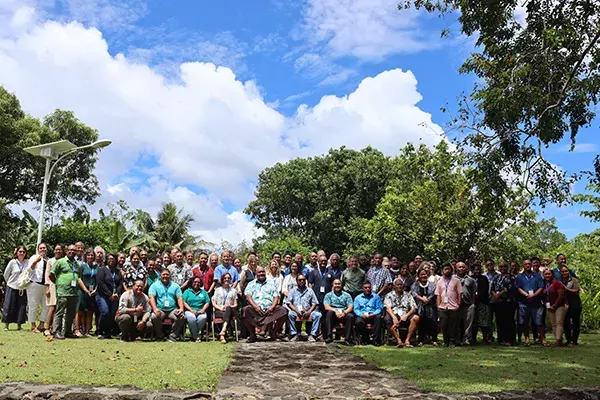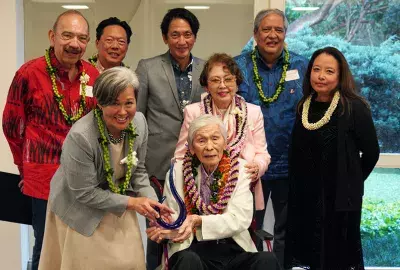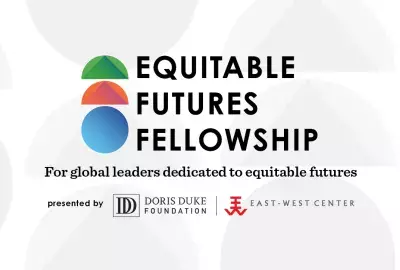Error message

OFFICE/DEPARTMENT
KOROR, PALAU (Oct. 7, 2022) — Effective management, eradication, and prevention of invasive species in the Pacific Islands region require a robust, coordinated, and collaborative regional approach.
This was the resounding message and commitment made by over 100 representatives from across the Pacific region at the inaugural Pacific Ecological Security Conference (PESC) that took place from October 3-5 in Palau. The conference was hosted by the Government of Palau, the East-West Center, The Pacific Community (SPC), the Global Environment Facility, the Nature Conservancy, the US Office of Insular Affairs, and the US Forest Service.
Biosecurity experts, development partners, regional organizations, agricultural and natural resource managers, researchers, government, and national ministers came together to identify and discuss how to address the critical threat of invasive species.
“This first PESC has reminded us that invasive species impact every aspect of Pacific Island life and security. While we have many of the tools we need for their prevention, control, and eradication, we also recognize that no country can do it alone. This has given us the opportunity to align regional strategies and build off our successes to tackle the problem of invasive species in a comprehensive way across our whole Blue Pacific Continent,” said Dr. Laura Brewington, Research Fellow at the East-West Center.
Strategic action plans developed by expert working groups on coconut rhinoceros beetles, invasive ants, and biological control approaches were presented and discussed during the three-day conference. Participants endorsed the action plans and committed to further coordination to address these key priorities.
“The Pacific is made up of small island fragile ecosystems and is home to some of the richest biodiversity in the world, which is now being threatened by invasive species. Now more than ever, addressing invasive species should be at the forefront of our priorities and this meeting was a positive step forward to jointly ensure there is a strong regional coordinated approach to these critical threats,” said Gibson Susumu, The Pacific Community (SPC) Programme Leader for Sustainable Agriculture.
“It’s important to recognize the vulnerabilities of our region and how invasive species exacerbate existing issues,” Mr. Susumu continued, “For example, the Pacific is at the frontline of the climate crisis, and invasive species only further undermine the resilience of our ecosystems. SPC is already working closely with our members and will continue this commitment to address these key concerns. This conference has provided a great opportunity to explore and strengthen partnerships to collaborate further.”
Participants shared stories from across the region about the multi-faceted and devastating impact of invasive species on the Pacific. The loss of endemic and vital plants and trees, such as the coconut tree, has deep cultural significance to the people of the Pacific Islands, whose identities and livelihoods are often tied closely to their land and seas. From their experiences, participants were also able to share strategies for successfully controlling and eradicating invasive species.
Conference participants represented more than 16 Pacific countries and territories, including Australia, New Zealand, and development partners from Japan, Taiwan, and the United States. Recordings of the plenary sessions will be available for public viewing after the conference. Visit Pacific RISA for more information.
About the East-West Center:
The East-West Center promotes better relations and understanding among the people and nations of the United States, Asia, and the Pacific through cooperative study, research, and dialogue. Established by the US Congress in 1960, the Center serves as a resource for information and analysis on critical issues of common concern, bringing people together to exchange views, build expertise, and develop policy options.
About The Pacific Community:
The Pacific Community (SPC) is the principal scientific and technical organization in the Pacific region, proudly supporting development since 1947. We are an international development organization owned and governed by our 27 country and territory members.
KOROR, PALAU (Oct. 7, 2022) — Effective management, eradication, and prevention of invasive species in the Pacific Islands region require a robust, coordinated, and collaborative regional approach.
This was the resounding message and commitment made by over 100 representatives from across the Pacific region at the inaugural Pacific Ecological Security Conference (PESC) that took place from October 3-5 in Palau. The conference was hosted by the Government of Palau, the East-West Center, The Pacific Community (SPC), the Global Environment Facility, the Nature Conservancy, the US Office of Insular Affairs, and the US Forest Service.
Biosecurity experts, development partners, regional organizations, agricultural and natural resource managers, researchers, government, and national ministers came together to identify and discuss how to address the critical threat of invasive species.
“This first PESC has reminded us that invasive species impact every aspect of Pacific Island life and security. While we have many of the tools we need for their prevention, control, and eradication, we also recognize that no country can do it alone. This has given us the opportunity to align regional strategies and build off our successes to tackle the problem of invasive species in a comprehensive way across our whole Blue Pacific Continent,” said Dr. Laura Brewington, Research Fellow at the East-West Center.
Strategic action plans developed by expert working groups on coconut rhinoceros beetles, invasive ants, and biological control approaches were presented and discussed during the three-day conference. Participants endorsed the action plans and committed to further coordination to address these key priorities.
“The Pacific is made up of small island fragile ecosystems and is home to some of the richest biodiversity in the world, which is now being threatened by invasive species. Now more than ever, addressing invasive species should be at the forefront of our priorities and this meeting was a positive step forward to jointly ensure there is a strong regional coordinated approach to these critical threats,” said Gibson Susumu, The Pacific Community (SPC) Programme Leader for Sustainable Agriculture.
“It’s important to recognize the vulnerabilities of our region and how invasive species exacerbate existing issues,” Mr. Susumu continued, “For example, the Pacific is at the frontline of the climate crisis, and invasive species only further undermine the resilience of our ecosystems. SPC is already working closely with our members and will continue this commitment to address these key concerns. This conference has provided a great opportunity to explore and strengthen partnerships to collaborate further.”
Participants shared stories from across the region about the multi-faceted and devastating impact of invasive species on the Pacific. The loss of endemic and vital plants and trees, such as the coconut tree, has deep cultural significance to the people of the Pacific Islands, whose identities and livelihoods are often tied closely to their land and seas. From their experiences, participants were also able to share strategies for successfully controlling and eradicating invasive species.
Conference participants represented more than 16 Pacific countries and territories, including Australia, New Zealand, and development partners from Japan, Taiwan, and the United States. Recordings of the plenary sessions will be available for public viewing after the conference. Visit Pacific RISA for more information.
About the East-West Center:
The East-West Center promotes better relations and understanding among the people and nations of the United States, Asia, and the Pacific through cooperative study, research, and dialogue. Established by the US Congress in 1960, the Center serves as a resource for information and analysis on critical issues of common concern, bringing people together to exchange views, build expertise, and develop policy options.
About The Pacific Community:
The Pacific Community (SPC) is the principal scientific and technical organization in the Pacific region, proudly supporting development since 1947. We are an international development organization owned and governed by our 27 country and territory members.







